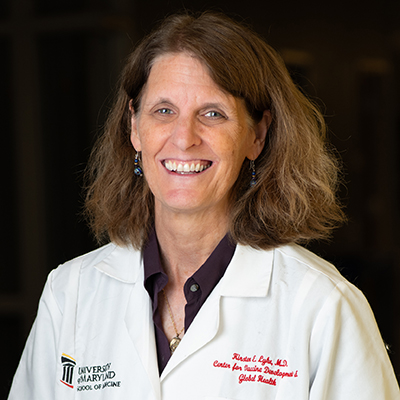Kirsten E. Lyke, MD

Professor, Department of Medicine
Center for Vaccine Development and Global Health
School of Medicine
From the remote reaches of Michigan’s Upper Peninsula to the front lines of global vaccine development, University of Maryland School of Medicine (UMSOM) professor Kirsten E. Lyke, MD, has charted a career defined by brilliance, persistence, and compassion.
Her journey reflects not only scientific excellence but also the deeply human drive to alleviate suffering and improve lives across the globe. Growing up in a rural region known more for rugged landscapes than research laboratories, Lyke did not set out to be counted among the world’s foremost vaccine innovators. Her early dream was to become an archaeologist, captivated by the mysteries of human history. But life — and a serendipitous decision to apply to medical school — would set her on a different path, one that would alter the course of public health worldwide.
After earning her undergraduate degree, Lyke embarked on a medical education that tested her resilience and sharpened her scientific focus. She trained at Cornell University, completed medical school at Georgetown and her residency at Duke, and pursued infectious disease fellowship training at Johns Hopkins. Along the way, she also served in the U.S. Air Force, gaining firsthand experience in discipline, leadership, and global service.
Because of her impactful work, Lyke has been named the University of Maryland, Baltimore’s (UMB) 2025 Founders Week Researcher of the Year. She will be honored along with the other Founders Week award winners Oct. 23 at the Awards Recognition and Reception at M&T Bank Exchange.
“Dr. Lyke’s extraordinary contributions to the field of infectious diseases have improved our ability to develop effective vaccines and saved lives throughout the world,” said James D. Campbell, MD, MS, interim director of UMSOM’s Center for Vaccine Development and Global Health (CVD). “I cannot think of another investigator on our campus who has contributed clinically relevant evidence to support such a wide range of infectious disease control efforts in the U.S. and throughout the world.”
Lyke’s research and leadership are consistently highlighted in leading scientific journals such as the NewEngland Journal of Medicine, Science, Nature, and Lancet as well as national media outlets such as The New York Times and Rolling Stone magazine.
“Much of her work is collaborative and interdisciplinary, and she has developed and led new and innovative research programs with colleagues at the Institute for Genome Sciences and the Institute of Human Virology,” Campbell said.
Said Lyke: “You need a purpose to get up every day. I’ve been fortunate to have been mentored by giants in the field. My colleagues are brilliant and dedicated, and it is humbling to work with people who are trying to make a difference in the world. Being part of the CVD team is rewarding in that we are all part of something bigger than ourselves, advancing science in ways that make a real difference in people’s lives.”
Fighting Malaria from Mali to Maryland
In 2002, Lyke arrived at UMSOM, an institution that would become her professional home and the launching point for several groundbreaking vaccine studies.
Lyke’s earliest work at UMB took her to Mali, where she immersed herself in the challenges of malaria, a disease that claims hundreds of thousands of lives annually, primarily among children. The experience not only solidified her scientific interest in vector-borne diseases, it also instilled a lifelong commitment to working alongside communities disproportionately burdened by infectious diseases.
Back in Baltimore, Lyke became director of UMB’s Vector-Borne Diseases Vaccine and Challenge Unit, where she rebuilt the University’s human malaria challenge models — specialized clinical studies in which healthy volunteers are safely exposed to pathogens in tightly controlled environments. These models, once thought to be too difficult to implement, became a critical tool under her leadership.
Her team conducted groundbreaking malaria vaccine trials — the first of their kind in humans — and setstandards for what vaccine science could achieve. These early successes positioned UMB as a global leader in infectious disease research and forged new paths in vaccine testing that continue to guide the field today.
Expanding the Arsenal: Ebola, Dengue, Zika, and COVID-19
Lyke’s contributions extend far beyond malaria. She helped design and implement Phase I trials for Ebola vaccines, offering critical insights during a time when the world urgently sought protection against the devastating outbreaks in West Africa. She also contributed to the development of early dengue and Zika vaccines, tackling two of the fastest-spreading mosquito-borne threats in the Americas and beyond.
But perhaps her most visible impact came during the COVID-19 pandemic. At a time when the world’s hopes hinged on rapid, effective vaccine development, Lyke and her colleagues at UMB became central players in clinical trials. She was the principal investigator for pivotal early studies on the Pfizer BioNTech mRNA vaccine and in studies evaluating COVID-19 booster shots, producing data that directly informed U.S. national vaccination policy. Her work ensured that science moved at the speed of crisis, balancing urgency with rigorous evidence.
“Dr. Lyke’s leadership during the pandemic was extraordinary,” Campbell said. “She not only carried the weight of historic trials but also provided clarity and confidence when uncertainty was everywhere.”
In recognition of her career of contributions, Lyke was inducted in 2024 to the National Academy of Medicine — one of the highest honors in the field of health and medicine. This accolade capped a series of distinctions, including institutional honors at UMB and regional awards for research excellence.
“Her election to the National Academy of Medicine underscores her transformative impact,” Campbell said.
Despite international recognition, Lyke is described by her peers as humble and approachable.
A Mentor and a Model
Beyond her research, Lyke is known for her mentorship. She invests deeply in training the next generation of scientists — whether in Baltimore; Bamako, Mali; or Kathmandu, Nepal. Her teams recall her steady encouragement, her insistence on precision, and her ability to create a supportive environment even amid the pressures of high-stakes trials.
Lyke’s influence has helped launch the careers of young investigators across the globe, expanding not only the pipeline of scientific talent but also the reach of UMB’s mission.
Equally important to Lyke’s legacy is the humanity she brings to her work. Her global engagements are not limited to laboratories and clinics. She has embraced communities, built lasting relationships, and, in her personal life, reflected a lifelong commitment to bridging cultures and caring for others.
Those who know her best point to her empathy as a driving force. “Science is rigorous, yes, but for Kirsten, it’s also about people,” Campbell said. “She never loses sight of the families who live in the shadow of malaria, Ebola, or COVID. That’s what makes her work so powerful.”
Lyke’s honor underscores UMB’s central role in shaping global health — and highlights one of its brightest exemplars. From malaria trials in Mali to vaccine policy that shaped a nation, her work bridges continents and generations, reminding us of the extraordinary impact one dedicated physician-scientist can have.
— Joanne Morrison



